With report days for training camp fast approaching, it’s a good time to summarize what we learned about all 32 teams this offseason.
Some teams made splashy moves, but they might not be enough for those who reside in the competitive AFC with the reigning Super Bowl champion Chiefs.
And the NFC shouldn’t be overlooked, with a handful of teams improving through free agency and the draft. It won’t be just the Eagles, 49ers and Cowboys ruling what was supposed to be a down season for the conference.
O.K., enough stalling.
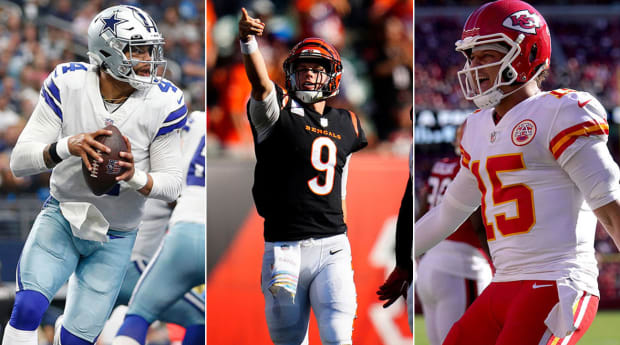
Tim Heitman/USA TODAY Sports (Prescott); Sam Greene/The Enquirer/USA TODAY Network (Burrow); Cary Edmondson/USA TODAY Network (Mahomes)
Arizona Cardinals
- What we learned: The Cardinals are going to be very bad.
Many will agree on this one, because the Cardinals have several roster holes, specifically on the defensive line. Oh, and Budda Baker wants to be traded, the team recently released DeAndre Hopkins, and Kyler Murray and Zach Ertz are recovering from torn ACLs. Did I miss anything? On the bright side, the Cardinals do have three quality tackles (Paris Johnson Jr., D.J. Humphries and Kelvin Beachum) to protect Murray, or draft prospects Caleb Williams or Drake Maye in 2024.
Atlanta Falcons
- What we learned: The Falcons want to end trendy Vic Fangio–based schemes.
The running backs are making a comeback, and the Falcons are leading the charge, attacking Fangio-inspired defenses built on limiting downfield plays by running the ball more and using shorter throws. The Falcons now have running back Bijan Robinson, the No. 8 pick in the draft, to pair with Tyler Allgeier, who topped 1,000 rushing yards as a rookie. But this run-heavy approach in Atlanta might backfire if Desmond Ridder struggles as the starting quarterback.
Baltimore Ravens
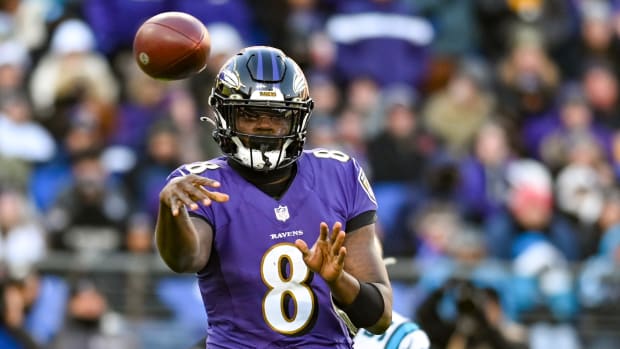
Tommy Gilligan/USA TODAY Sports
- What we learned: Lamar Jackson didn’t need an agent after all.
Remember all the hot takes about Jackson needing to hire an agent? Turns out there are other options to get paid. Jackson did O.K. with a five-year, $260 million contract with $135 million fully guaranteed. He had plenty of leverage because he knew the Ravens weren’t interested in losing him, and the 2020 draft quarterbacks (Jalen Hurts, Justin Herbert, Joe Burrow) were on the verge of raising the pay scale at the position. This approach created plenty of offseason drama, but it made Jackson the highest-paid player in the league.
Buffalo Bills
- What we learned: Stefon Diggs was actually very mad about that playoff loss.
Whatever is going on with Diggs and the Bills probably goes back to Diggs’s expressing his frustrations on the sideline during the shellacking they took from the Bengals in the 2022 divisional round. We all just assumed things were fine because the offseason came and went with Diggs still on the roster, but obviously something isn’t sitting right with the All-Pro wideout. Regardless of the issue, Sean McDermott better be right in saying it’s been resolved, because the Bills have no option but to fix it.
Carolina Panthers
- What we learned: Carolina welcomes Bryce Young with a quick fix.
The Panthers might have provided the blueprint for putting a rookie quarterback—or an undersized quarterback—in position to succeed right away in the NFL. After the Panthers landed the No. 1 pick from the Bears to eventually draft Young, they quickly went to work by re-signing center Bradley Bozeman, and adding wide receiver Adam Thielen, tight end Hayden Hurst and running back Miles Sanders. It’s not the best offensive roster, but there aren’t any glaring holes, and that might be enough for Young to quickly find his footing.
Chicago Bears
- What we learned: Ryan Poles is good at his job.
Poles spent his first year as GM of the Bears by repairing the salary cap and adding assets to build a roster around Justin Fields. He turned the Bears’ No. 1 pick into wide receiver DJ Moore and four draft picks from the Panthers. Poles also drafted tackle Darnell Wright to go with last year’s gem pick, left tackle Braxton Jones, and signed veteran guard Nate Davis. Poles also helped coach Matt Eberflus with the signings of linebackers Tremaine Edmunds and T.J. Edwards. The Bears might be ahead of schedule in their rebuild project thanks to the moves made by Poles this offseason.
Cincinnati Bengals
- What we learned: The Bengals are all in this season.
The Bengals surprised many after they signed Orlando Brown Jr. to play left tackle. That signified that Cincinnati was all in on winning a Super Bowl this season with Joe Burrow, Tee Higgins and Ja’Marr Chase due for contract extensions—Chase will be eligible to negotiate an extension after the 2023 season. If the Bengals lock down Burrow, their Super Bowl window will be open for years to come, but this season seems like a golden opportunity to get to the mountaintop before the salary cap becomes a real issue.
Cleveland Browns
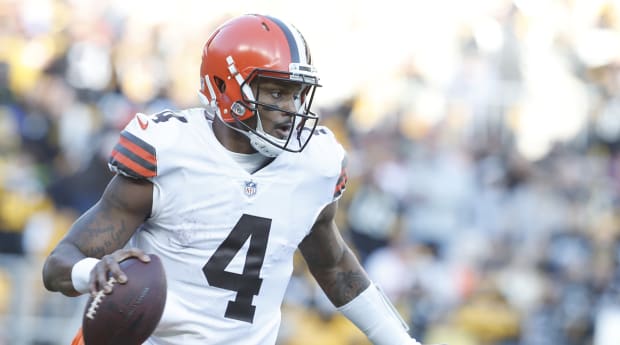
Charles LeClaire/USA TODAY Sports
- What we learned: The Browns’ busy offseason might not help Deshaun Watson.
The Browns have a stacked roster after upgrading on the defensive line with the arrivals of former Vikings Za’Darius Smith and Dalvin Tomlinson. But having a dominant defense with reliable playmakers and protection on offense might not matter if Watson doesn’t regain his All-Pro form from his days in Houston. He wasn’t himself last season during his first six games in Cleveland after returning from a suspension, and it might be more of a mental issue than rust from not playing since 2020.
Dallas Cowboys
- What we learned: This could be Dak Prescott’s final year in Dallas.
Jerry Jones’s patience with Prescott has to be running short after another divisional-round exit last season. With Prescott due for another contract, the Jones family might consider moving on from the quarterback if the Cowboys don’t at least reach the NFC title game for the first time since 1995.
Denver Broncos
- What we learned: Sean Payton built around Russell Wilson.
Who knows what Payton truly thinks of Wilson after his dismal first season in Denver, because Payton didn’t have the option of getting rid of him thanks to the massive extension the Broncos handed Wilson last year. But Payton did add Jarrett Stidham as insurance—or encouraged GM George Paton to sign the former Patriots and Raiders quarterback. If Wilson continues to hold the ball for long stretches, Payton can turn to Stidham, because at least the protection should be better with the arrivals of guard Ben Powers and tackle Mike McGlinchey.
Detroit Lions
- What we learned: The Lions don’t care about your opinions.
Oftentimes, those new to the spotlight tend to listen to public opinion and forget about what got them there in the first place. Regardless of what your opinions are about the Lions’ unique draft approach—I’ve been critical of them drafting running back Jahmyr Gibbs and off-ball linebacker Jack Campbell in the first round—they’re doing it their way. That’s something you have to respect. The Lions have built a winning culture under coach Dan Campbell and GM Brad Holmes, and they’re staying true to their identity.
Green Bay Packers
- What we learned: Many aren’t giving Jordan Love a chance.
We’ve seen this movie before with the Packers going from a future Hall of Famer (Brett Favre) to a first-round quarterback (Aaron Rodgers) who was forced to wait his turn. Fifteen years later, many are convinced it will be a different outcome this time with Green Bay going from Rodgers to Love, a 2020 first-round pick. Sure, topping what Rodgers achieved in Green Bay will be tough, but Love has a vast skill set and spent three years learning from his predecessor. It sure seems like Love has better odds to succeed than flop, at least to me.
Houston Texans
- What we learned: The Texans are no longer waiting for next season.
The teams that say “maybe next year” through the uninspiring moves they make in the offseason tend to say “maybe next year” often. The Texans were that team the past two seasons, placing former head coaches David Culley and Lovie Smith in positions to fail for better draft picks. But the Texans finally went for it by drafting quarterback C.J. Stroud No. 2 and edge rusher Will Anderson Jr. No. 3, which required Houston to send a 2024 first-round pick to Arizona to move up from No. 12. Many have knocked the Texans for removing themselves from the Caleb Williams and Drake Maye sweepstakes next draft, but they at least gave new coach DeMeco Ryans an opportunity to succeed with two potential cornerstone players.
Indianapolis Colts
- What we learned: The Shane Steichen effect could pay off for years to come.
I’ve been wondering whether the Colts would have drafted quarterback Anthony Richardson at No. 4 if they hadn’t hired Shane Steichen as coach. Richardson was viewed by many draft pundits as a boom-or-bust prospect due to his issues with accuracy and other fundamentals that are required with playing quarterback. But the Colts favored Richardson’s elite skill set, probably because of Steichen’s track record of developing quarterbacks, such as Justin Herbert and Jalen Hurts. If Richardson reaches his potential, the Colts are going to be happy they trusted Steichen’s coaching résumé.
Jacksonville Jaguars
- What we learned: A quiet offseason is good for Jacksonville.
The Jaguars seem to be the forgotten team in the AFC, because they didn’t make a splash this offseason. But they already spent big last year and traded for wide receiver Calvin Ridley during the 2022 season, you know, when the Jaguars beat the Chargers in the wild-card round before pushing the Chiefs the following round. The Jaguars aren’t a perfect team, but they should again be in the mix this season.
Kansas City Chiefs
- What we learned: The Chiefs aren’t worried about the receivers room.
On paper, the Chiefs might have one of the worst wide receiver units in the league, but they aren’t concerned about it. That’s the luxury of having Patrick Mahomes, Travis Kelce and coach Andy Reid. Just like last year after trading Tyreek Hill to Miami, the Chiefs will probably find a way to make it work with Kadarius Toney, Marquez Valdes-Scantling and Skyy Moore.
Las Vegas Raiders

Kirby Lee/USA Today network
- What we learned: The Raiders might already be in the race for Caleb Williams.
I get Josh McDaniels wanted a quarterback who’s familiar with his offense, which Jimmy Garoppolo is from their days together in New England. But going into the season with Garoppolo, who has a lengthy list of injuries, with Brian Hoyer and fourth-round rookie Aidan O’Connell as the backups, might be a sneaky way of entering the race for Williams without blatantly tanking away the season. If Garoppolo is healthy the entire season, maybe the Raiders will be competitive. But if he isn’t, that’s probably O.K., too.
Los Angeles Chargers
- What we learned: Cornerback J.C. Jackson is going to be O.K.
Jackson working on the side during mandatory minicamp and telling reporters that he’s on track to play this season are good signs for a team in need of secondary help. Jackson is eight months removed from surgery to repair a ruptured patellar tendon in his right knee that forced him to miss the final 11 games of last season. Like the Jaguars, the Chargers were also quiet this offseason, but staying healthy might be all they need to make a deep postseason run.
Los Angeles Rams
- What we learned: The Rams will put up a fight.
The Rams could easily be one of the teams tanking this season for the prize quarterbacks next draft, but I continue to focus on them keeping Matthew Stafford, Cooper Kupp and Aaron Donald, and having Sean McVay return after he contemplated leaving for a TV analyst job. That group alone could make the Rams a feisty team that might find itself in the mix for a wild-card spot in December.
Miami Dolphins
- What we learned: It’s now or never for Tua Tagovailoa.
I also wrote this after the Dolphins traded for Jalen Ramsey. The Dolphins might need one more trade to make all these bold moves worth it, and that involves adding another quarterback. I say that because Tagovailoa has struggled with staying on the field, and if he can’t do that this year, Mike White or Skylar Thompson won’t be enough to get the Dolphins far in the postseason. This could be the final opportunity Tagovailoa will get to prove he can be a long-term franchise quarterback in Miami.
Minnesota Vikings
- What we learned: Kirk Cousins will likely play elsewhere in 2024.
Training camp is around the corner, and the Vikings haven’t given Cousins another short-term contract extension. With the team having the option of getting out of Cousins’s current deal next offseason, all signs point to this being Cousins’s final year in Minnesota. The Vikings spent the offseason shedding salary and parting with veterans such as running back Dalvin Cook, linebacker Eric Kendricks, Adam Thielen and Za’Darius Smith.
New England Patriots
- What we learned: The Patriots will be very good defensively.
The Patriots have plenty of uncertainty on the offensive side with quarterback Mac Jones, but they’re loaded with defensive playmakers, especially in the secondary with Kyle Dugger, Jonathan Jones, Jabrill Peppers and rookie Christian Gonzalez. Matthew Judon and Josh Uche also give New England a ferocious pass-rushing tandem. But having a stacked defense might not matter if Jones can’t ignite the offense.
New Orleans Saints
- What we learned: The Saints refuse to look in the mirror.
The Saints have proved they can work around a tight salary cap, but why go through the trouble of restructuring contracts for a roster that likely isn’t a Super Bowl contender? New Orleans operates like it’s still 2018 and the team’s a few pieces away from winning it all. Landing Derek Carr will make the Saints contenders in the lackluster NFC South, but it’s tough to see them competing with the Eagles, Cowboys, 49ers, Lions and Seahawks in the conference. At some point, they’ll have to hit the reset button.
New York Jets
- What we learned: Aaron Rodgers’s arrival won’t get the Jets far.
The Jets will be in the mix with Rodgers and a talented young roster, but they have a daunting road to making it to the Super Bowl or even winning the AFC East, a stacked division with the Bills, Dolphins and Patriots. The Rodgers-led Jets also have to compete with the Chiefs, Bengals, Ravens, Jaguars and Chargers in the conference.
New York Giants
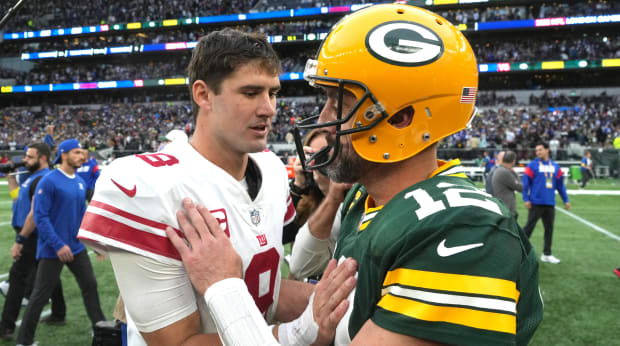
Kirby Lee/USA TODAY Sports
- What we learned: The training wheels are coming off for Daniel Jones.
Giants coach Brian Daboll probably didn’t push the ball downfield last season partly because of Jones’s issues with protecting the football before he got to New York. Now that Jones has proved himself, earning him a four-year, $160 million contract this offseason, expect the Giants to attack downfield with the arrivals of tight end Darren Waller and wide receivers Parris Campbell and Jalin Hyatt.
Philadelphia Eagles
- What we learned: The Eagles draft better than most teams.
This one is obvious. The Eagles continued to nail the draft after ending the first round with Jalen Carter and Nolan Smith. But the most impressive part is that the Eagles don’t need those two to produce right away because of the depth GM Howie Roseman has built through the draft and free agency. For example, Javon Hargrave left in free agency to San Francisco, and Jordan Davis, a 2022 first-round pick, was available to fill the void. That type of preparation will be how the Eagles will work around Hurts’s new contract taking a bulk of the salary cap for the foreseeable future.
Pittsburgh Steelers
- What we learned: Many are counting out a Mike Tomlin–led team.
Tomlin has never had a losing season in 16 seasons as coach, and the Steelers haven’t finished last in the division in nearly 35 years. But here we are with many expecting the Steelers to finish last in the AFC North, including the oddsmakers. I won’t be one to bet against Tomlin.
San Francisco 49ers
- What we learned: The 49ers don’t want to see what they have in Trey Lance.
There was a sense of relief around the 49ers after they announced that Brock Purdy was ahead of schedule and could be ready for the start of the season. With the 49ers having a Super Bowl–ready roster, they probably don’t have time to learn whether Lance, the No. 3 pick in the 2021 draft, is capable of leading a franchise. Purdy, the final pick in the ’22 draft, might have secured his starting spot for the long haul by being available this summer after undergoing surgery on his throwing arm.
Seattle Seahawks
- What we learned: The Seahawks are this year’s sleeper Super Bowl contender.
More should be taking the Seahawks seriously after the offseason moves they made, such as drafting Devon Witherspoon and Jaxon Smith-Njigba. If Geno Smith proves to be more than a one-year wonder, the Seahawks might have one of the best rosters in the NFC. They also have enough playmakers on offense and defense to keep pace with the mighty 49ers in the NFC West.
Tampa Bay Buccaneers
- What we learned: The Buccaneers are trying to compete.
It was surprising that the Buccaneers decided to re-sign cornerback Jamel Dean and linebacker Lavonte David in what was supposed to be a rebuilding year with Tom Brady retiring. But playing in the subpar NFC South probably had the Buccaneers thinking they could win the division for a third consecutive year with Baker Mayfield or Kyle Trask as the starting quarterback. It’s probably not worth losing a chance to draft Caleb Williams or Drake Maye, but they’re at least trying in Tampa Bay.
Tennessee Titans
- What we learned: The Titans will regret neglecting wideouts.
Titans brass mocked those who pleaded for them to select a wide receiver early in the draft, but they probably should have listened when it comes to this situation. Treylon Burks had a rough rookie season, but he’s already entrenched as the team’s No. 1 wideout due to the lack of depth at the position. Kyle Philips, a 2022 fifth-round pick with four career games, and Nick Westbrook-Ikhine, who made 25 catches for 397 yards last season, are expected to round out the starting receiver lineup.
Washington Commanders
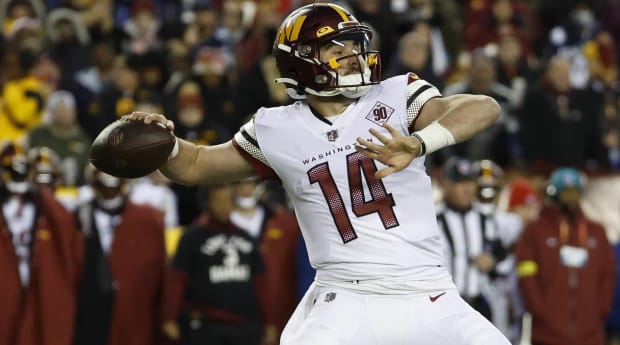
Geoff Burke/USA Today network
- What we learned: The Commanders weren’t bluffing about Sam Howell.
Maybe it was more about Ron Rivera not wanting a rookie quarterback as his starter heading into a critical fourth season as coach with new ownership coming in, but it says something that the Commanders passed on drafting a quarterback to essentially make Howell QB1 for the upcoming season. We’ll find out soon whether the offseason praise for Howell, a 2022 fifth-round pick, was warranted.







